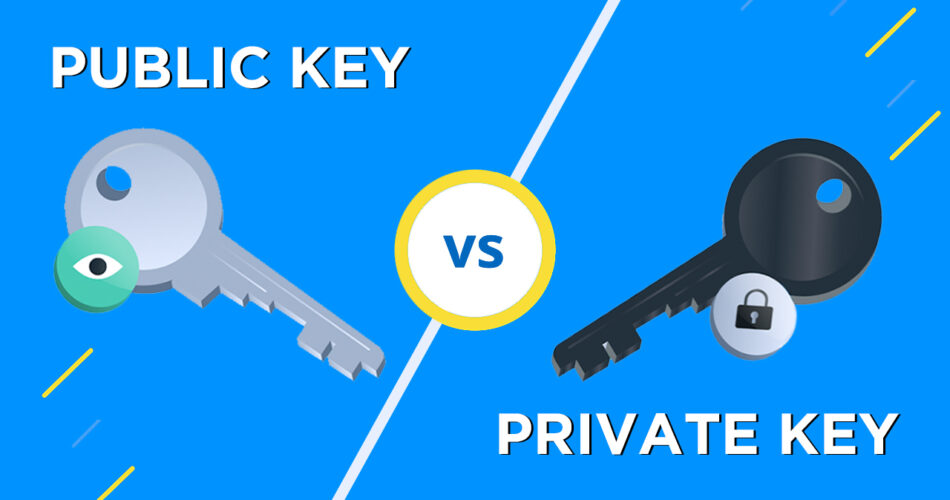In the ever-evolving landscape of digital technology, understanding the nuances of security is paramount. One of the most critical aspects to grasp is the concept of Public Key vs Private Key. This article aims to demystify these terms, delve into their differences, and explore their significance in cryptography and blockchain technology. Whether you’re a crypto enthusiast or someone concerned about digital security, this guide is a must-read.
Table of Contents
What is Cryptography?
Cryptography is the art and science of securing communication. Originating from the Greek words ‘kryptos’ meaning ‘hidden’ and ‘graphia’ meaning ‘writing,’ cryptography has been around for centuries. In today’s digital age, it serves as the backbone of secure communication and transactions over the internet.
Basics of Keys in Cryptography
Keys are fundamental elements in cryptography. They come in two main types:
- Symmetric Keys: One key is used for both encryption and decryption.
- Asymmetric Keys: Two different keys are used—one for encryption (Public Key) and another for decryption (Private Key).
| Type of Key | Encryption | Decryption | Security Level |
|---|---|---|---|
| Symmetric | ✔️ | ✔️ | Moderate |
| Asymmetric | ✔️ | ❌ | High |
What is a Public Key?
A Public Key is an alphanumeric string that is openly shared and used for encryption. It’s like your email address—a piece of information you can share openly because it’s used to send you encrypted messages that only you can decrypt.
Characteristics of Public Key
- Openly shared
- Used for encryption
- Generated from a Private Key
What is a Private Key?
A Private Key, on the other hand, is your secret alphanumeric code used to decrypt messages. Think of it as the password to your email account—you wouldn’t share this with anyone.
Characteristics of Private Key
- Kept secret
- Used for decryption
- Generates a Public Key
Public Key vs Private Key: The Differences
Understanding the differences between Public and Private Keys is crucial for anyone involved in digital transactions, secure communications, or data protection. This section aims to dissect the distinctions between these two types of keys in a comprehensive manner.
Ownership
Public Key
- Publicly Owned: Your Public Key is like your home address; it’s publicly available and anyone can use it to send you encrypted messages or digital assets.
Private Key
- Privately Owned: Your Private Key is like the key to your home; only you should have access to it. It’s used to decrypt messages or authorize transactions that are sent to your Public Key.
Accessibility
Public Key
- Open to Everyone: Public Keys are designed to be openly shared. They are often stored in a directory or database where others can look them up.
Private Key
- Restricted Access: Private Keys must be kept confidential. Only the owner should have access to it, often stored securely offline or in a hardware wallet.
Usage in Encryption and Decryption
Public Key
- Used for Encryption: The Public Key is used to encrypt messages or data. Anyone can use your Public Key to encrypt a message, but only you can decrypt it using your Private Key.
Private Key
- Used for Decryption: The Private Key is used to decrypt messages or data that were encrypted using the corresponding Public Key. It’s also used to create digital signatures to prove the authenticity of a message.
Security Level
Public Key
- Moderate Security: While Public Keys are secure to a certain extent, the level of security is not as high as that of Private Keys. This is because they are publicly accessible and can be used by anyone for encryption.
Private Key
- High Security: Private Keys offer a higher level of security. They are the only means to decrypt messages encrypted with the corresponding Public Key, making them highly secure but also a point of vulnerability if not stored safely.
Table Summarizing the Differences
| Criteria | Public Key | Private Key |
|---|---|---|
| Ownership | Publicly owned | Privately owned |
| Accessibility | Open to everyone | Restricted access |
| Usage | Encryption | Decryption |
| Security | Moderate | High |
Use Cases
Public and Private Keys are not just theoretical constructs; they have real-world applications that touch various aspects of our digital lives. Below are some of the most common use cases where these keys play a critical role.
Digital Signatures
Public Key
- Role: Verification
- Description: The Public Key is used to verify that a digital signature attached to a message or document is genuine. This ensures the integrity and origin of the message.
Private Key
- Role: Signature Creation
- Description: The Private Key is used to create a digital signature. This signature proves that the message or document has been sent by the legitimate owner of the Private Key.
Secure Communication
Public Key
- Role: Encryption
- Description: In secure communications like emails or messaging apps, the Public Key is used to encrypt the message. This ensures that only the intended recipient can read it.
Private Key
- Role: Decryption
- Description: The Private Key decrypts the message encrypted by the corresponding Public Key, allowing the recipient to read the secure communication.
Cryptocurrency Transactions
Public Key
- Role: Transaction Address
- Description: In the world of cryptocurrencies like Bitcoin and Ethereum, your Public Key serves as your wallet address. Others use it to send you cryptocurrencies.
Private Key
- Role: Transaction Authorization
- Description: The Private Key is used to authorize transactions from your cryptocurrency wallet. Without it, you cannot send cryptocurrencies to another wallet.
Data Integrity
Public Key
- Role: Verification
- Description: Public Keys can be used to verify that a set of data has not been tampered with, ensuring its integrity.
Private Key
- Role: Data Sealing
- Description: Private Keys can be used to “seal” a set of data, creating a unique signature that can be verified later to ensure the data hasn’t been altered.
Detailed Chart Summarizing Use Cases
| Use Case | Public Key Role | Private Key Role | Description |
|---|---|---|---|
| Digital Signatures | Verification | Signature Creation | Ensures the integrity and origin of messages or documents. |
| Secure Communication | Encryption | Decryption | Allows for secure, confidential communications between parties. |
| Cryptocurrency Transactions | Transaction Address | Transaction Authorization | Enables secure and verified transactions in the cryptocurrency ecosystem. |
| Data Integrity | Verification | Data Sealing | Ensures that a set of data remains unaltered and can be verified for integrity. |
Importance in Blockchain
Blockchain technology has revolutionized the way we think about trust and security in a digital world. At the heart of this paradigm shift are Public and Private Keys, which serve as the cornerstone of blockchain’s cryptographic security model. Below, we delve into the various ways these keys are integral to blockchain technology.
Wallet Addresses
Public Key
- Role: Wallet Identifier
- Description: In blockchain networks like Bitcoin and Ethereum, your Public Key essentially serves as your wallet address. It’s the identifier that others use to send you cryptocurrencies or interact with you on the blockchain.
Private Key
- Role: Wallet Access
- Description: Your Private Key is what grants you access to your blockchain wallet. It’s the cryptographic equivalent of a password, and without it, you cannot access your funds or execute transactions.
Transaction Authorization
Public Key
- Role: Transaction Verification
- Description: When you initiate a transaction on the blockchain, your Public Key is used to verify that the transaction was indeed authorized by you. It confirms the legitimacy of the transaction to the network.
Private Key
- Role: Transaction Signing
- Description: Before a transaction can be added to the blockchain, it needs to be signed by the sender’s Private Key. This digital signature proves that the transaction was initiated by the legitimate owner of the wallet.
Smart Contracts
Public Key
- Role: Contract Interaction
- Description: In blockchain networks that support smart contracts, like Ethereum, your Public Key is used to interact with these self-executing contracts. It serves as your identifier within the smart contract’s code.
Private Key
- Role: Contract Authorization
- Description: To execute functions within a smart contract, such as transferring tokens or triggering specific conditions, your Private Key is used to authorize these actions.
Decentralized Identity
Public Key
- Role: Identity Verification
- Description: Blockchain can be used to create decentralized identity systems. Your Public Key serves as your identifier, allowing you to control your personal data without relying on a central authority.
Private Key
- Role: Identity Control
- Description: Your Private Key allows you to control your decentralized identity. It enables you to update, share, or revoke access to your personal data on the blockchain.
Security Implications
The security of your digital assets, communications, and data largely depends on how well you manage your Public and Private Keys. While these keys offer robust security features, they also come with their own set of vulnerabilities if not handled correctly. Below, we explore the security implications associated with Public and Private Keys.
Key Storage
Public Key
- Role: Public Storage
- Description: Public Keys are generally stored in public directories or blockchain ledgers. While it’s okay for them to be publicly accessible, you should still ensure that the directory or service you’re using is reputable.
Private Key
- Role: Secure Storage
- Description: Private Keys must be stored securely. Using hardware wallets, paper wallets, or secure digital vaults are some of the best practices for storing Private Keys.
Key Compromise
Public Key
- Role: Limited Risk
- Description: The compromise of a Public Key is generally less risky as it’s used for encryption and is publicly accessible. However, if someone gains unauthorized access to your Public Key along with other personal information, they could attempt phishing attacks.
Private Key
- Role: High Risk
- Description: The compromise of a Private Key is a serious security breach. If someone gains access to your Private Key, they can decrypt messages, authorize transactions, and essentially take over your digital identity.
Key Rotation
Public Key
- Role: Optional Rotation
- Description: Some experts recommend rotating Public Keys periodically, especially for high-security applications. However, this is generally less critical compared to Private Keys.
Private Key
- Role: Recommended Rotation
- Description: Rotating your Private Key is a good security practice, especially if you believe it has been compromised or if it has been used for an extended period.
Best Practices
- Never Share Your Private Key: This is the golden rule of digital security. Your Private Key should never be shared with anyone.
- Use Hardware Wallets: For added security, especially for cryptocurrency, use a hardware wallet to store your Private Keys.
- Two-Factor Authentication (2FA): Enable 2FA wherever possible to add an extra layer of security.
- Regular Updates: Keep your wallet software and security measures up to date.
- Backup: Always have secure backups of your keys, especially your Private Key, in multiple locations.
Conclusion
As we navigate the intricate labyrinth of the digital world, understanding the roles and implications of Public and Private Keys becomes not just a technical necessity but a fundamental life skill. This article has aimed to demystify these cryptographic keys, breaking down their differences, exploring their real-world applications, emphasizing their importance in blockchain technology, and shedding light on the critical security practices associated with them.
Key Takeaways
- Public and Private Keys are Cornerstones: Whether it’s securing digital transactions, ensuring data integrity, or facilitating secure communication, these keys are the building blocks of digital security.
- Blockchain Revolution: The advent of blockchain technology has elevated the importance of understanding Public and Private Keys. They are foundational to everything from cryptocurrency transactions to decentralized identities.
- Security is Paramount: The safety of your digital assets hinges on how well you manage these keys. From secure storage solutions to regular key rotation, adopting best practices is non-negotiable.
- Knowledge is Power: The more you understand about these keys, the better equipped you are to navigate the digital landscape securely. Ignorance is not bliss when it comes to digital security; it’s a vulnerability.
Next Steps
If you’re new to the world of cryptography or blockchain, consider taking the following steps:
- Educate Yourself Further: This article is a starting point. Dive deeper into each topic to gain a comprehensive understanding.
- Implement Security Measures: If you haven’t already, start implementing the security best practices mentioned in this article.
- Stay Updated: The world of digital security is ever-evolving. Make it a habit to stay updated on the latest trends and threats.
Final Thoughts
In a world where data breaches and cyber threats are becoming increasingly sophisticated, taking the time to understand the basics of Public and Private Keys is not just advisable; it’s imperative. As we continue to integrate digital technologies into every facet of our lives, let’s make sure we’re doing it securely. After all, in the digital realm, knowledge isn’t just power—it’s your best line of defense.
FAQs
What happens if I lose my Private Key?
You lose access to your digital assets.
Can I recover a lost Private Key?
No, it’s impossible to recover a lost Private Key.
Is it safe to share my Public Key?
Yes, Public Keys are meant to be shared.


